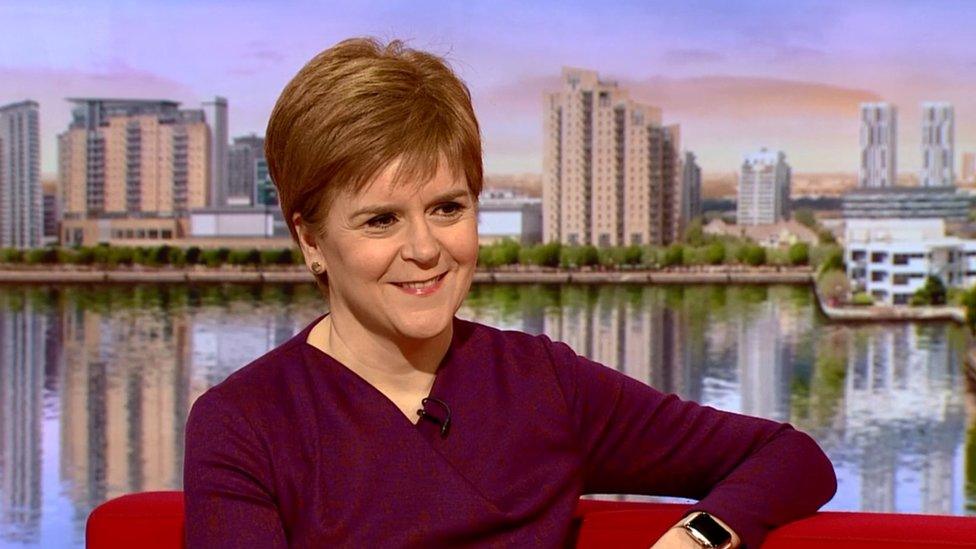Sturgeon: 'All options' open if Scottish independence referendum blocked
- Published
- comments

Nicola Sturgeon has refused to rule out taking legal action if a Conservative government blocks a second Scottish independence vote.
Appearing on BBC Breakfast the SNP leader said she would not hold a Catalan-style unauthorised vote.
Ms Sturgeon was pressed on what her options would be given that Boris Johnson has repeatedly said he will not permit indyref2.
She would "cross that bridge then" but would "consider all options", she said.
The first minister stressed that a majority Conservative government was "not inevitable" after the 12 December election and said whoever ends up in No 10 must "respect the will of the Scottish people".
"I do believe whoever is in Downing Street, they have a duty to respect the will of the Scottish people", she continued.
If Mr Johnson remains as PM and continues to refuse to grant permission for a fresh vote on independence, she pledged she would "set out how I intend to cross that bridge then".
"We're in an election campaign right now," Ms Sturgeon said. "Whatever the polls might be suggesting, and they look as if they are narrowing a bit, a Tory majority isn't inevitable."
Pressed on whether the Scottish government would mount a legal challenge if Westminster continued to refuse to allow a referendum, or would stage an unofficial ballot, Ms Sturgeon said the vote would have to be "legitimate".
She said: "I've made my view quite clear on an unofficial referendum, I think a referendum has to be legal and accepted because I'm not in the business of just having a referendum, I want Scotland to become independent so you have to have a process of doing that that is going to be recognised as legitimate.
"Beyond that, though, I will consider all options."

CONFUSED? Our simple election guide, external
POLICY GUIDE: Who should I vote for?, external
POSTCODE SEARCH: Find your local candidates, external

Ms Sturgeon wants any referendum to be "legal and legitimate", to ensure the result is recognised internationally.
This is why she wants the UK government to give formal consent to the vote by transferring powers to Holyrood through what is known as a Section 30 order - as happened in 2014.
The first minister has repeatedly refused to be drawn on what exactly she would do if the UK government refuses to agree to a fresh independence referendum, although she noted on BBC Radio 5Live that the question of whether Holyrood could legislate for a poll without a transfer of power has "never been tested in court"., external
Ms Sturgeon has however ruled out an unofficial referendum, similar to the one held in Catalonia in 2017, saying that example shows that "it does not lead to independence".
'Scotland will choose to be independent'
Ms Sturgeon told BBC Breakfast: "The first option is making sure we don't get into this scenario because Scotland is playing its part in making sure Boris Johnson is not in this position of being able to lay down the law to Scotland or anybody else."
She said whatever the result of the election "SNP MPs will always push Scotland's case and fight for those progressive policies, whatever the arithmetic is in the House of Commons".
But Ms Sturgeon said her party's influence would be "increased in strength" if there was a hung Parliament leaving "Scotland is holding the balance of power".
She said the central point in the election for Scotland was: "Do we have our future decided for us by the likes of Boris Johnson and the people who are pulling his strings, like Nigel Farage and Donald Trump, or do we decide our future for ourselves and the kind of country we want to be?"
Ms Sturgeon said: "If you are asking me to predict, I believe very, very strongly, particularly after the last few years, that given that choice in the future Scotland will choose to be independent."
SNP leader Nicola Sturgeon discusses a potential second Scottish independence referendum
After her interview on the breakfast sofa, the SNP leader took part in a BBC 5 Live radio programme where she answered questions sent in by the public.
The Scottish Conservatives' interim leader, Jackson Carlaw MSP, appeared on BBC Radio Scotland on Monday morning. He was the latest in a series of Scottish party leaders to take part in a live interview and phone-in session. His party have committed in their manifesto, external to "stop Nicola Sturgeon's plan for a second independence referendum next year".
The Scottish Liberal Democrat leader Willie Rennie said his party is the only one committed to "stopping Brexit and stopping independence" and argued that Scotland needed to move on from "constitutional chaos".
Labour say they will not agree to a Scottish independence referendum in the "early years" of government, external. Although Jeremy Corbyn says he does not plan to rely on other parties for support after the election, Ms Sturgeon has said she would consider supporting a Labour minority government on an issue-by-issue basis in return for support of specific policies - one of which is the power to hold another referendum, which the SNP have indicated they want to take place next year.